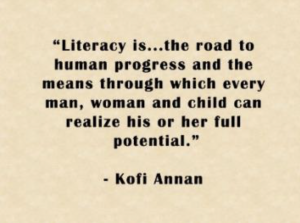Currently being updated
English is the foundation of our curriculum. It is embedded throughout our curriculum through reading, writing, speaking and listening. Our English curriculum will enable our pupils to speak and write fluently so that they can communicate their ideas and emotions to others, and through their reading and listening, enable others to communicate with them. Through reading in particular, our pupils will develop culturally, emotionally, intellectually, socially and spiritually. Reading also enables our pupils both to acquire knowledge and to build on what they already know. All the skills of language are essential to participating fully as a member of society, and we value Literacy as the key to accessing knowledge and skills in other subjects, and therefore we teach all aspects of English rigorously. We strive to ensure all pupils leave us with a good standard of reading and writing as we appreciate the lifelong opportunities this will afford them. There is a clear plan for progression. Children will be supported to close any gaps in their learning. Where children show high ability, talent and interest, they will be challenged. Every effort will be made to identify and lift barriers to learning. English will be presented as a subject to enjoy.
We aim for our children to be reading fluently by the time they leave our school so that they are motivated to read for pleasure and able to fully access all future learning opportunities.
At the heart of reading is its purpose – reading for meaning. We aim to develop pupils’ passion for literature and their intrinsic motivation to read. We aim to promote a simple view of reading where word recognition and language comprehension combine to develop effective lifelong readers. We recognise the importance of spoken language in developing comprehension and vocabulary and promote strong pupil voice within effective teaching and learning. Vocabulary development is understood to be key to reading comprehension. We use carefully selected text to develop empathy and our key Christian core values.
Our whole school approach to reading develops readers’ confidence, engagement and excitement with reading. The teaching of reading is systematic and rigorous with phonic and decoding skills together with the acquisition of ‘tricky’ words being key in EYFS and KS1. Jolly Phonics informs our teaching of phonics.
At the early stages, reading resources are closely matched to phonic awareness. As children build fluency and their reading age progresses, they explore in greater depth the individual aspects of reading comprehension including word reading (decoding, full word recognition, fluency, phonological awareness and print knowledge) and Language comprehension ( inference, comprehension, text structure, grammar, syntax and vocabulary).
Every class is developing its own Reading Spine, a core set of texts that ensures all of our children get to experience a varied and rich selection of high quality texts and authors.
Active reading and written comprehension is taught across the school, guided by the Literacy Tree. A structured book band scheme supports fluency, stamina and building confidence with reading, with regular assessments and questioning. Reading is continually assessed using our Reading End Points.
Individual needs are identified and met. Barriers are lifted through:
- SHINE and Precision Teaching interventions
- additional daily reading
- supporting parents to promote reading at home.
Quality first teaching ensures that pupils’ responses to texts are effectively questioned and developed. Teachers use a wide range of strategies to teach reading including class, group and individual reading. There are dedicated times in the day for reading and we are currently developing our library to become a hub where pupils will have opportunities to visit as groups, classes and individually, in class time and during lunch clubs; where an excellent range of reading resources will be available to pupils. The fantastic Empathy Lab bundles are an annual addition to our book collection.
Children are encouraged to share their own experiences of reading and books they have enjoyed. They are actively involved in selecting their own books and encouraged to spend time in our welcoming book areas sharing books with each other. We are currently introducing a schoolwide reading raffle to celebrate children’s involvement in reading. We always welcome volunteers to support children’s reading in school.
https://www.jollylearning.co.uk/jolly-phonics/
Pupils make progress in reading in line with National Curriculum expectations. There is a buzz around reading where children enjoy reading different genres and want to read and share their love for literature. Children transition to high school with key competencies in reading in line with national expectations. Children read widely, often and with fluency. Pupils are able to identify different question types and can generate literal, inferential and evaluative questions for themselves. Through reading children are supported to access the wider curriculum with increasing independence.
Our aim is that our children leave school as confident, capable and independent writers, being able to communicate their knowledge, understanding ideas and emotions through their writing. Writing standards will be in line with national expectations to support children to fully access the wider curriculum. We aim for children to not only understand the purpose and importance of writing but also to enjoy the process.
Children will be exposed to a variety of quality literature of varied genres to support their writing experiences and to have opportunities to develop their oracy skills in order to:
- develop vocabulary,
- articulate and justify answers, arguments and opinions,
- give well-structured descriptions, explanations and narratives for different purposes
- Participate in discussions, role play, debates and presentations
- Consider and evaluate viewpoints
We aim for children to be able to spell new words effectively through the use of spelling patterns and rules and have a solid understanding of punctuation and grammar, applying them effectively and consistently to their writing.
We aim for children to take pride in their writing and be able to write so others can read it, through the use of a legible, cursive handwriting style and through confident use of Information Technology.
Across the school, children receive daily English lessons. Units of work are carefully planned through the use of our progression documents, assessments and curriculum coverage charts in order to ensure high quality, exciting and relevant writing activities covering a range of genres, purposes and audiences. Our marking policy supports children in understanding their next steps to progress. Appropriate scaffolding approaches are provided to support learners, they also enjoy a variety of teaching approaches including collaborative, partner work, pupil talk, peer assessment, learning ladders in order to enable them to reflect on their progress, evaluate, make improvements and set new targets.
Regular assessed ‘Big Write’ pieces of writing are completed throughout the year in order to effectively assess and inform planning. In addition, children complete grammar, punctuation and spelling checks termly in order to monitor progress and identify gaps in learning. Children are supported through targeted interventions to lift barriers to learning and close gaps in learning. Quality first teaching ensures quality and there is a collaborative approach to moderate work between classes and year groups.
Children leave school as confident, enthusiastic writers with the skills necessary to access the next stage of learning. They have stamina to write at length and with focus. They can adapt their writing for purpose and audience. They enjoy writing and use it to develop their voice.




